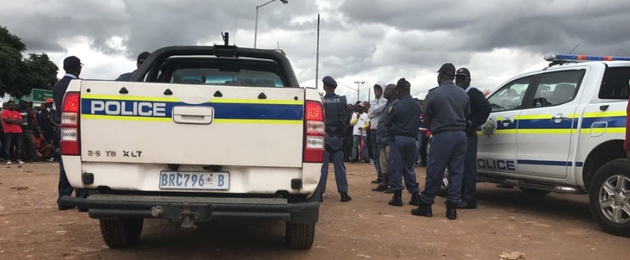The lack of adequate responses to tackling crime has resulted in communities unlawfully taking matters into their own hands and blaming migrants, refugees and asylum seekers for crime, leaving this group vulnerable to attacks, Amnesty International South Africa said.
Impunity for crimes that incite xenophobia has also contributed to the situation we see unfolding in Diepsloot over the last few days.
On 6 April 2022, Police Minister Bheki Cele reportedly told the media that seven people were killed in the Diepsloot area over the weekend. These killings reportedly sparked mass protests with the community threatening to shut down the township.
On Wednesday evening, a Zimbabwean man was killed allegedly by a mob going door-to-door demanding documents of residents.
“Authorities need to step up and adequately respond to high crime rates and deal with xenophobic attacks on vulnerable migrants who have become a scapegoat for communities unhappy with issues of crime,” Amnesty International South Africa Executive Director Shenilla Mohamed said.
“Police need to act against anyone perpetrating a crime, but also those who take the law into their own hands. The state has failed South Africans and migrants living in the country by not dealing with high crime rates, and by allowing impunity to continue around xenophobic attacks.
“The violation of people’s rights to safety, security, dignity and life must not be allowed to continue with impunity.”
Despite its strong legal and human rights framework on refugees and asylum seekers’ rights, South Africa’s asylum management system is failing, leaving hundreds of thousands of applicants without proper documentation and exacerbating xenophobia in the country.
“The current asylum management process system is failing everyone. In persisting with a broken system that leaves those trying to claim asylum undocumented and in limbo, the government is causing a divide and inflaming tensions between South African citizens and fellow Africans living in the country,” Shenilla Mohamed said.
Background
Police Minister Bheki Cele, Gauteng premier David Makhura, and national police commissioner, General Sehlahle Fannie Masemola, visited the Diepsloot area on 6 April, after protests broke out in the area.
Community leader Lefa Nkala reportedly said illegal immigrants perpetrated their first crimes by entering the country illicitly and continue to terrorise the community with further crimes.
TimesLive reported that Minister Cele announced that an increased police presence would monitor the area over the next 24 hours.
Following Police Minister Bheki Cele’s visit to Diepsloot, it was reported that community members were patrolling the area in the evening going door-to-door demanding people provide resident documents. According to News24, a Zimbabwean man did not have documents and tried to run, but the community caught him and burnt him.
According to Amnesty International’s Annual Report 2021/22 - The State of the World’s Human Rights, there are over 153,000 outstanding asylum applications in South Africa. The government and UNHCR, the UN refugee agency, signed a US$9.6 million agreement in March to clear the backlog and revamp the asylum management system by 2024.
In May 2021, the Western Cape High Court ruled that the Cape Town Refugee Reception Office (RRO), which had been closed in 2012, be reopened. This followed the Department of Home Affairs’ failure to comply with a 2017 court order issued by the Supreme Court of Appeals to reopen the RRO by March 2018. Since its closure, asylum seekers living in Cape Town had to travel to Durban, Musina or Pretoria every few months (1,455km, 1,633km and 1,923km, respectively) to renew their permits.
Amnesty International South Africa released a report in 2019 titled Living in Limbo: Rights of Asylum Seekers Denied found, among other things that that poor decision-making, including mistakes of fact and lack of sound reasoning, had resulted in a 96% rejection rate of asylum applications and a massive backlog of appeals and reviews – around an estimated 190,000. This kept some asylum seekers in the asylum system without a final decision of their case for as long as 19 years.
There have been sporadic xenophobic attacks throughout last year and this year.
For more information or to request an interview, please contact:
Genevieve Quintal, Media and Communications Officer, Amnesty International South Africa: +27 (0)64 890 9224; genevieve.quintal@amnesty.org.za
Public Document
****************************************
Amnesty International South Africa office, 97 Oxford Road, Saxonwold, Johannesburg, 2196
press@amnesty.org


